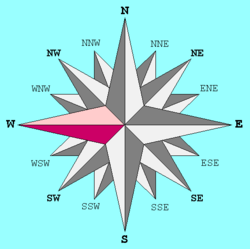West: Difference between revisions
m Typo fixing, Typos fixed: commenly → commonly, refered → referred (2), using AWB |
.anacondabot (talk | contribs) m robot Modifying: sk:Západ (svetová strana) |
||
| Line 71: | Line 71: | ||
[[ru:Запад]] |
[[ru:Запад]] |
||
[[simple:West]] |
[[simple:West]] |
||
[[sk:Západ]] |
[[sk:Západ (svetová strana)]] |
||
[[sl:Zahod]] |
[[sl:Zahod]] |
||
[[sr:Запад]] |
[[sr:Запад]] |
||
Revision as of 19:59, 4 March 2007

- This article refers to the cardinal direction; for other uses see West (disambiguation).
West is most commonly a noun, adjective, or adverb indicating direction or geography.
West is one of the four cardinal directions or compass points. It is the opposite of east and at right angles to north and south.
By convention, the left side of a map is west.
To go west using a compass for navigation, set a bearing or azimuth of 270°.
West is the direction towards which the sun sets at the equinox, and therefore the direction opposite that of the Earth's rotation.
Moving continuously west is following a circle of latitude, which, except in the case of the equator, is not a great circle.
The English word "west" is cognate to the Old High German word westar, which may derive from an Indo-European root from which the Latin word vesper, meaning "evening", derives.
History
When the United States was first developing, many people went "west". West originally from the western edge of the Mississippi River to approx. Oklahoma/South Dakota. Then the more what was formaly referred to as "the west" was being more commonly referred to as the "Midwest". After that the land beyond was becoming increasingly popular.
Geography
Western Canada and the Western United States are frequently referred to as simply "The West", both within those countries and abroad, as are, similary, West Europe and Western world.
Symbolic meanings
In Chinese Buddhism, the West represents movement toward the Buddha or enlightenment (see Journey to the West). The ancient Aztecs believed that the West was the realm of the great goddess, of water and mist, and of maize. In Ancient Egypt, the West was considered to be the portal to the netherworld.[1]
Moving West in American literature, especially The Great Gatsby, symbolizes gaining freedom. This probably has to do with the colonization of the United States of America and Manifest Destiny.
References
- ^ Campbell, Joseph. The Mythic Image. Princeton University Press, 1981.
